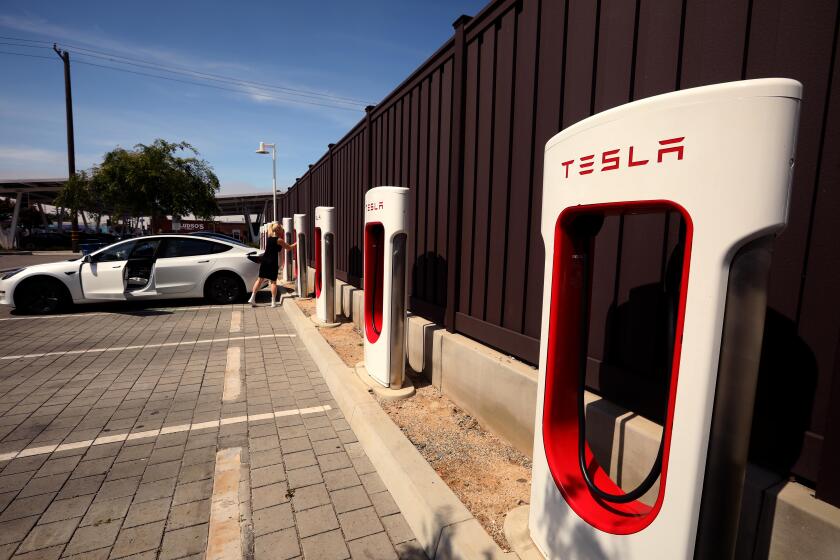Parents hold key to keeping their young driver safe
Today’s busy parents seem to be under increasing pressure to give their teens vehicles as soon as they’ve passed their driver’s tests. This urgency is often for the sake of convenience -- for kids and parents alike.
“I don’t like to admit it, but it’s true,” says Kathy Dirkins, co-president of Westlake High School’s PTSA. Hectic work and family schedules make it impossible for many parents to chauffeur their teenagers to activities or jobs.
A nationwide study last year by Teen Research Unlimited found that 18% of teenagers 16-19 owned new cars and 75% owned used cars. In 1998, only 13% of teens had new cars and 68% had used vehicles.
The study surveyed 2,000 teens, according to Michael Wood, vice president of the Northbrook, Ill., research firm (www.TeenResearch.com).
Not all parents want to rush out and purchase a vehicle for their young driver, or can afford to. Some parents worry that once a teen has his or her own vehicle the parents lose control over what the teen is doing.
That seems like a valid concern. I’ve had friends complain that once they handed the keys over to their teen, grades dropped and keeping track of their whereabouts became increasingly difficult.
“I’ve heard too many stories over the years about kids getting a brand-new BMW, crashing it and then getting another one,” says Erin Powell, a counselor for the Las Virgenes Unified School District.
Take a spin around many student high school parking lots, and you’ll see teens driving everything from Volvos and BMWs to giant SUVs. The pressure on many parents isn’t just to provide a car, it’s to provide a status symbol.
If you are considering purchasing a first vehicle for your teen, here are some tips:
Before you even set foot in a dealership, make sure your teen has the skills and training to safely drive a vehicle, says Candysse Miller, executive director of the Insurance Information Network of California.
Miller says to keep in mind that motor vehicle crashes are the leading cause of death among young people.
Also, don’t let your teens dictate the kind of vehicle you choose, no matter how much they whine or browbeat you. Surveys show kids aren’t concerned about safety -- they’re more interested in what’s flashy and trendy, of course. So mom and dad need to be vigilant on that issue, Wood advises.
Don’t rely on the word of a car salesman, who may steer you to a vehicle that’s inappropriate. Do your own research. The National Highway Traffic Safety Administration (NHTSA) has a website that assesses vehicle safety: www.nhtsa.dot.gov/cars/testing/ncap
One big misconception parents often have is that a large truck or SUV is the safest vehicle for their teen. Pairing a teenage driver with an SUV could be a fatal combination, says Miller. These big vehicles can be difficult to handle even for experienced drivers. .
Mid-size vehicles, particularly sedans, are considered a good choice for new drivers by Consumer Reports and other auto safety advocates. Miller says Volkswagen bugs have become popular with teens and their parents because of their high crash-test ratings, affordability and low gas mileage. Wood says his company’s research shows that the Honda Civic is the No. 1 practical choice among teens.
Though teens are interested in customizing, or “tricking out,” their vehicles, safety advocates warn parents not to allow their teens to jeopardize their safety by raising the height of a vehicle, adding oversize tires or even adding a monster sound system that shakes the vehicles around you and can distract drivers.
Make a contract with your teenager, says Powell, the school counselor, who helps organize programs to help curb reckless driving. She urges parents to set time and distance limits on driving. If they break the rules, take away the car keys, she says.
Some parents require good grades in exchange for getting a vehicle. If the grades drop, the teenager loses driving privileges.
One way to keep tabs on your teen drivers is to check mileage, says Powell. Some anxious parents have even hired private detectives to check on teens who they feared were involved in risky behavior. Others have turned to technology.
Electronic vehicle-monitoring devices can record speed, distances traveled, acceleration rates and whether seat belts are worn. Road Safety International in Thousand Oaks and SmartDriver of Houston market these products.
Dirkins worries that some parents are too lax on safety with their teen drivers. “There are parents who automatically give kids cars who haven’t even spent much time behind the wheel with their parents.”
Under California’s new-license procedures, young drivers are required to spend 50 hours behind the wheel with their parents. “I think a lot of parents can’t be bothered with that,” says Dirkins, whose son, Sean, 17, drives a 1999 Jeep Cherokee.
A car represents so many things to a teenager, cautions Wood. “When they they get their license a whole world opens up to them because they no longer have to depend on parents for transportation. It can be intoxicating.”
E-mail: jeanrite@aol.com



